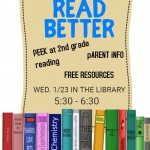“Hey, are you willing to try something in your classroom?”
“Can I come in your class and test something out with your students?”
“I just read about a really intriguing strategy, will you read it and see what you think?”
As Thanksgiving nears, I’ve been feeling particularly grateful. I’ve asked each of the above questions or variations of them dozens of times. My gratitude stems from the fact that I work with the most dedicated, open-minded, and collaborative teachers who are always willing to say yes when I approach them with one of my questions.
Those that know me well know I read a lot and I’m intrigued by a good amount of what I read. Often, that intrigue results in an extremely strong urge to try it out for myself. When I was a classroom teacher, this was easily accommodated. I used my own classroom and students for action research quite often. I implemented new strategies that interested me and tracked how they impacted my students. Some of my best teaching practices came from these experiments.
Now, that I’m an instructional coach, I have to depend on the willing support of others when a new idea piques my interest.
The school I work in now was a TAP school when I was hired. One of the things that appealed to me about the TAP framework was the practice of field testing. The TAP implementation handbook defines field testing as, “…the process by which master teachers vet instructional strategies before utilizing them in professional development meetings.” Field testing is basically action research that is conducted by instructional coaches for the purpose of finding strategies that will benefit the students in your setting.
Field testing gave me the context to continue action research in the classroom even though I no longer had my own group of students. It also allowed me to gain some credibility and trust with teachers as an instructional coach. They knew I had “lived” what I was presenting in professional development.
My school is no longer an official TAP school. We’ve let some pieces from TAP quietly fade, while we’ve modified other aspects. However, one thing we’ve continued to do is field testing.
In the absence of TAP, field testing is no longer a requirement. But, I know the power of action research in the classroom and can’t imagine eliminating it from our school practice. However, continuing the practice depends on classroom teachers willing to let me borrow their students or willing to allow me to coach them through strategy implementation. Luckily, I work with such teachers.
Recently, some amazing teachers said yes when I asked them to field test strategies in their classrooms. After reading an article about a learning strategy, I approached one of our math mentors and asked if she would be willing to try it in her classroom. After reading the article she agreed to try it. She knew her students needed something more and she thought this strategy could be what they needed.
Not long after, I approached a few other teachers and asked them to field test an ELA strategy in their classrooms. We spent the majority of the school year planning lessons, monitoring student achievement results, and making adjustments when necessary.
All of the teachers willingly changed their schedules, routines, and current practices to engage in this action research. It was never easy. It took flexibility, time, perseverance, and trust in the process.
When all was said and done, these teachers who collaboratively engaged in the action research process with me saw the biggest student achievement gains of all the classrooms on our campus. The results were remarkable and helped propel our school into the top 5% in the entire state of Arizona for student achievement growth.
Based on the results, the teachers have permanently embedded the strategies in their practice. Further, the field tested strategies are being delivered to the rest of our staff through carefully planned professional development.
This is the power of action research. It provides a mechanism for educators to improve their instructional practices. The process of recognizing a student need, identifying a potential solution, implementing the solution, and monitoring its impact isn’t easy. But, it is one of the most powerful methods for driving professional growth and thereby student achievement.
Engaging in this level of work takes collaboration. It would be impossible for me to undertake this work on my own. The plans I envision after reading about a strategy would be unachievable without the educators with whom I work.
So, as we enter the season of Thanksgiving, I can’t help but feel appreciative. I cannot overemphasize the gratitude I feel for the teachers who listen to my sometimes crazy ideas, imagine all the extra work it might entail, and still look at me with a smile and say yes.










Comments 2
I love trying new things in my classroom too! It’s scary at first. But often it yields quality results. I always tell my students “I’ve never done this before. We are learning something new together.” It helps create buy-in and they often give me feedback that helps improve instruction.
I love this! I would gladly INVITE an instructional coach into my classroom to learn from, collaborate with, and field test new strategies. One day this might spill into arts education too (fingers crossed).